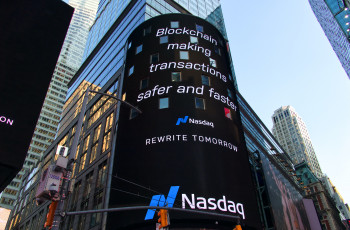Blockchain, everybody is talking about it, although very few understand how this technology works.
From the first view, we know that it has a close relationship with bitcoin. When we study the topic deeply, we realize that it could impact transparency on the internet, finances, government, and social media. Blockchain can offer private, transparent, and secure all at the same time, which is why many people are more interested in implementing this new technology.
The media and entertainment industry has to protect its intellectual property from being legally monetized. Blockchain has industry-wide applications that can change completely how content is consumed, created and protected.v With blockchain, media companies can face two big challenges that this industry faces in digital communications: protecting their content and monetizing their intellectual property.
Although this technology is in its early stages, many entertainment companies think about the possible applications for their business. Blockchain could transform the way content is done, distributed and consumed and the possibilities for content creates are endless.
When users can fully trust their governments and companies, it seems that blockchain will be the superhero to stop corruption from digital platforms. In this article, we will dive right into this topic to see how it can upgrade privacy and transparency in media.
Let´s see how!!!
What Is Blockchain? How Does It Work?
Blockchain is a secure and encrypted digital database shared by all parties of this distributed network. Any transaction that happens within it is recorded, verified and stored in the database, and every participant can see all the transactions, which creates an unalterable transaction log.
Christine Moy, program lead of J.P Morgan´s Blockchain Center of Excellence, says, “This (blockchain) essentially results in a golden source of truth that everyone can trust. That’s primarily one of the reasons why it’s called the ‘technology of trust”. This nickname is given because blockchain promises special properties like greater transparency and security. After all, every transaction can be fully verified by every user.
With blockchain, the information is not in the hands of a centralized server. Instead, all the participants can access the same version of data in real-time. There are no multiple copies of data in the network. The decentralization of the database allows companies for faster, less expensive transactions and could improve and cost-saving for businesses.
Applications of Blockchain in media and business
Some of the applications of this technology are…
Micropayments for Content
YouTubers or content creators can make exclusive videos on platforms like Patreon, but some users are unwilling to pay a monthly subscription for this content. Nevertheless, if fees are smaller, they could sacrifice to spend a little bit of money on this media, which means more revenue for the digital creator. This type of micropayments can be done with blockchain.
With blockchain, pay-per-use consumption can become feasible. Due to its ability to keep an understandable record of data, blockchain allows digital entertainers to accurately tracking when and how their copyrighted creations are watched or read. And while some professionals may think that a micropayment pricing model would be inefficient, its execution can fully automated and cost-effective with blockchain technology.
Help independent artists and content creators.
With the decentralized structure of blockchain, content creators, like musicians or writers, can have more freedom to share their work with consumers, sleep traditional distribution channels, and add more revenue for their creative work. This technology will help every niche, from large media houses to independent bloggers and even helping new artists directly relationship with their consumers.
Is this moment where we talk about NFTs (nonfungible tokens), a piece of digital media that relies on blockchain. Interestingly, without this technology, some pieces of art could be cheaper or even free, something that is not fear for artists around the world. We have to say that this type of art can be really profitable since artist like Mr. Hirst is selling a collection of 10,000 NFTs, each of them corresponds to a physical dot painting and can cost $2,000 each. He even launched his own cryptocurrency.
While some people may think that a piece of digital art is not as valuable as the physical painting, more and more collections are spending their digital money on this type of art, and it seems that the future aims right to this type of art.
Smart Contracts
The decentralized technology of blockchain can allow us to create smart contracts, a feature that could replace lawyers in the future. With these digital documents, there is no need for a third party to oversee the transaction. The parties of the negotiation are in control of their terms and alignments.
Smart contracts allow users to create agreements to exchange financial shares, exchange property, and are risk-free and faster. These contracts are executed entirely in the blockchain. Once a triggering event happens, the contract will execute automatically, moving funds, property or any valuable good in a secure and trackable way.
Royalty Distribution
With the growth of music streaming services, the distribution of royalty payments has become more opaque. If a famous song is streamed online or played in the background of a TV show, the distributor has to compensate the music´s copyright holder, and it can arise over the compensation rates of these royalties.
With smart contracts, artists can attach their work to this blockchain technology, and this could add precision, speed and trust to the process of distributing music and royalties since these contracts will automatically execute all the contract terms.
Blockchain will provide more accurate tracking of song usage with quicker royalty payments and increasing the transparency of all the contract terms and the division of revenue between creators and other stakeholders. If this technology is fully approved, it could eliminate the role of copyright collection associations, a centralized intermediate that gathers payments for right holders.
Product Tracking
As consumers, we can know a little about the history of the companies we buy from, and we can choose to believe that they comply with labour policies and do not use slave labour to produce their products. However, the reality may be opposite to what these companies allege, and in this case, we indirectly support labour exploitation.
With blockchain, there will be no opportunity to lie to buyers since the information provided by the platform will allow you to know if that shirt was woven by cheap labour or if those vegetables are really organic.
Blockchain technology will allow you to have full access to the entire production history of the companies and have information about all the products you buy and where they are located.
Healthcare
In the same way that blockchain can help you access all your financial movements, the same can be done with your medical history having all the information at your fingertips. In this way, no matter where you are, if you have a medical emergency, any hospital will be able to access your medical history without any problem, respecting all your private information. This is of great help to combat the counterfeit medication market, thanks to the tracking ability mentioned above.
Streaming Services and Cinema
In the same way that the blockchain can revolutionize the music industry, it can do so with audiovisual content such as cinema or TV programs. Although peer-to-peer file sharing is currently illegal, this can become a reality with blockchain technology, allowing the legal purchase of these entertainment products that will be delivered digitally. This can represent an extra profit for creators and producers of film or TV shows. In addition, it provides greater transparency and reliability in how films are consumed and distributed.
Social Media Platforms
Blockchain-based social networks can offer greater security to their users since their information is not monitored by the platform, but they choose the content that can be shared and users they want to publish it.
On several occasions, we have talked about how companies track their users through social networks, either with the use of cookies or with analytics. However, social networks based on blockchains like “Minds” allow greater privacy to their users since no centralized entity will be able to access their consumption patterns or interactions with other users.
The scandals involving social media have been innumerable, from the lawsuits against Mark Zuckerberg for sharing information that may have altered the presidential elections to the hacking of the Twitter accounts of personalities like Jeff Bezos, Kanye West, Joe Biden and even Elon. Musk.
The blockchain could bring full transparency for users and feel safe that their information and activity are not being tracked by centralized companies. If we analyze that Mark Zuckerberg owns Facebook, WhatsApp and Instagram, we can confirm that common social networks are centralized in a single person, which gives this businessman too much power.
Challenges of Blockchain
Blockchain can create more revenue streams for new and old content with more trusty protection of content, intellectual property for content creators. The downside of this is that this technology is not concrete, and all the applications are in the process of development. Companies and people who want to use this technology must be aware of the potential challenges and costs of blockchain. In 2021 blockchain is currently unregulated, and the standards for utilizing it to create value still need to be created.
To achieve the full potential and benefits of blockchain, it is necessary to replace current technology in many cases. All of this process will take some time. Meanwhile, the huge amount of data available today needs to be restored with a third party, and the moral question that comes with this action is, who will own that private data?
For the media industry, industry participants must work towards the development to apply this technology finding the areas where blockchain can benefit integrants of the industry like content creators, content aggregators and distributors.
Is blockchain the future of media?
Nothing lasts forever, and everything is a constant change. In the same way, as we have gone from Internet Explorer to Google Chrome, there may be a great possibility that the future of technology is interconnected to the blockchain and cryptocurrencies.
The additions that this technology promises, such as transparency in business, faster and more efficient ways to make economic transfers and aid to all content creators, look quite functional for a more honest internet with its users and more control. Of their decisions and content, they post.
Like anything, everything on paper and in words may sound fantastic, but the real test comes out once the technology begins to be tested by the same users. Until then, we will continue to inform you in CodeDesign of all the news in digital marketing and the virtual world. Meanwhile, we enjoy what we already have and get the most out of our current platforms.
Until a future video, in which perhaps the blockchain is already a reality, see you!
About the author:
We are Codedesign – a multi cultural, technology, award-winning digital marketing agency. We can be define as a result-led, innovative digital marketing agency specializing in Digital Marketing, Ecommerce, Online Sales, Amazon Sales with a team of experts in Search Engine Optimization (SEO), Pay Per Click Strategy and Campaigns, Social Media, Content Marketing, Data Analytics, Ecommerce development, Software development, CRM integrations.





